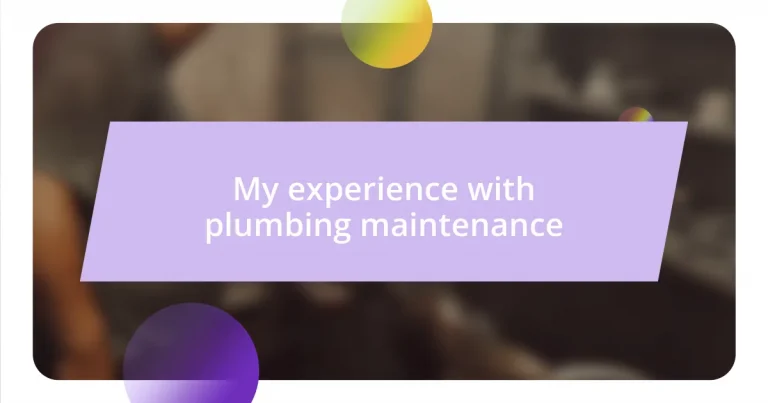Key takeaways:
- Recognizing the importance of preparation and having the right tools can significantly impact success in DIY plumbing tasks.
- Understanding plumbing systems and performing regular maintenance can prevent larger issues and enhance comfort in the home.
- Knowing when to call a professional is crucial, especially for severe issues or those involving gas and electrical systems, to avoid escalating problems.
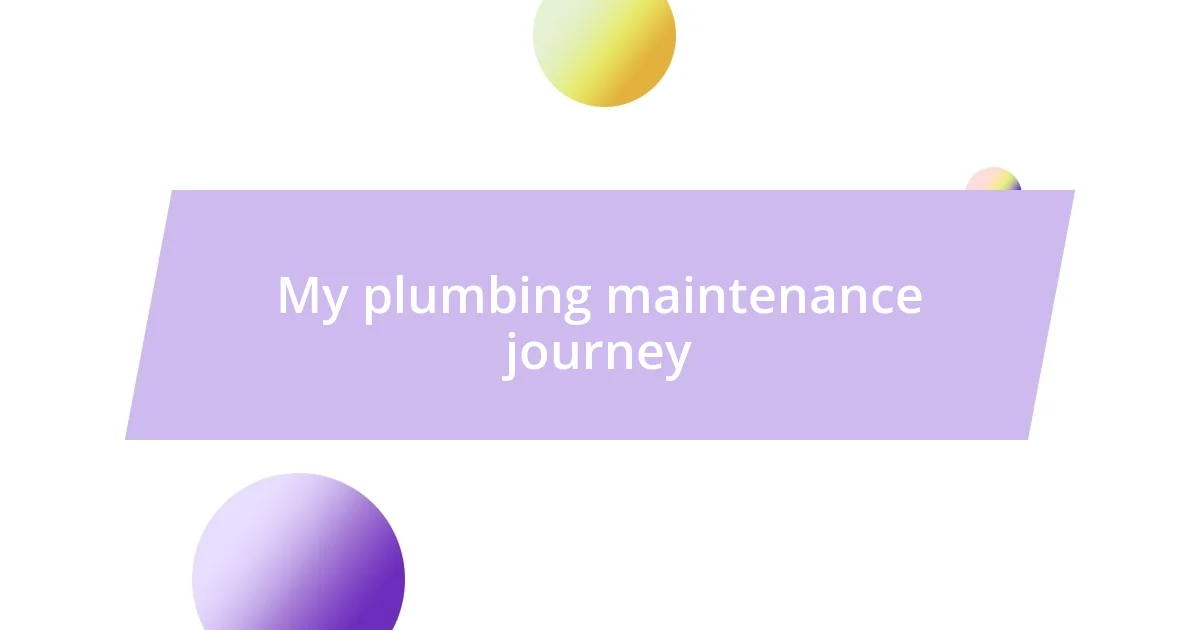
My plumbing maintenance journey
When I first tackled plumbing maintenance, I felt like I was navigating a foreign country without a map. I remember standing in front of my leaky sink, unsure whether to call a professional or dive into a DIY fix. The anxiety of potentially making things worse was palpable, and I asked myself, “Can I really handle this?”
One memorable incident was when I decided to replace a faucet on my own. Armed with a YouTube tutorial and a toolbox, I felt confident—until I realized that I couldn’t find the right wrench in the middle of the project. That moment of frustration was overwhelming, but it taught me the importance of preparation and having the right tools on hand. It made me question: why don’t we plan better for maintenance tasks that directly affect our homes?
As I continued my plumbing maintenance journey, I found myself developing a surprising sense of pride in my newfound skills. The first time I cleared a stubborn drain, I couldn’t help but feel victorious. It was a small win, but it ignited a desire to learn more. I often pondered, “If I can fix this, what else am I capable of?” This journey has transformed my relationship with maintenance; it’s no longer just a chore—it’s an opportunity for personal growth.
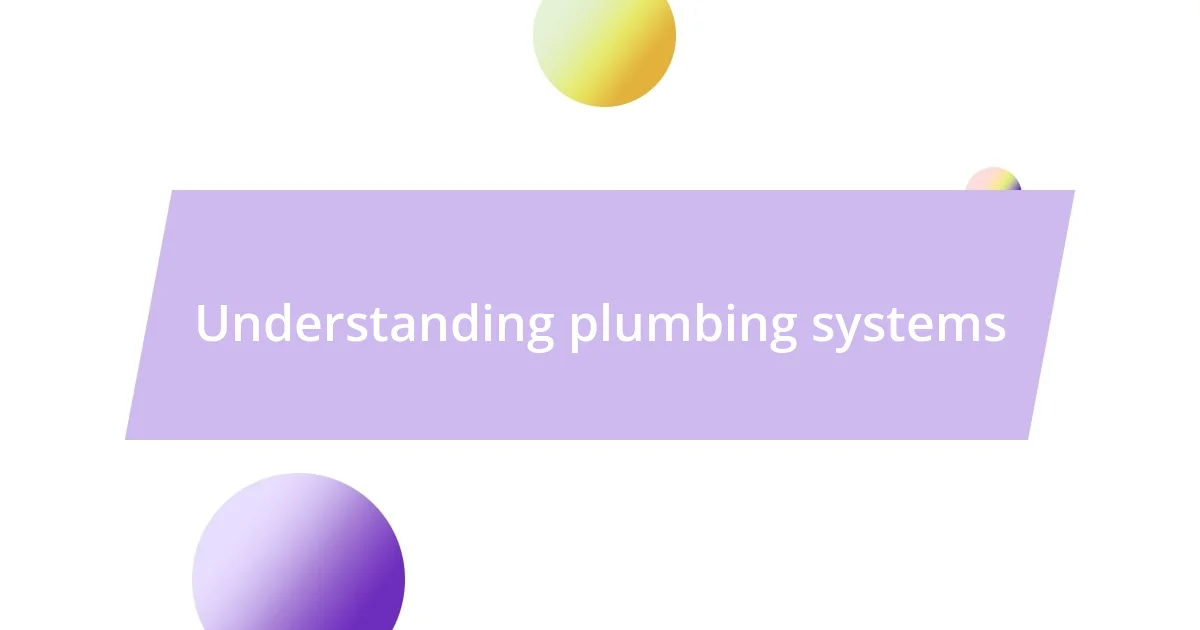
Understanding plumbing systems
Understanding plumbing systems can initially feel overwhelming, especially when you consider the intricate network of pipes and fixtures that make up our homes. I remember the first time I got to explore my own plumbing system; it was like uncovering an elaborate puzzle. Each pipe, fitting, and connection seemed to have its purpose, working together to ensure everything flowed smoothly. What struck me most was how vital these systems are, not just for functionality but for our overall comfort and hygiene.
As I delved deeper, I learned about the two primary types of plumbing systems: the potable water system, which delivers clean water, and the drainage-waste-vent (DWV) system, responsible for removing wastewater. This dual functionality intrigued me. I began to realize that if one system falters, the entire household can feel its impact; for instance, a clogged drain can quickly lead to an unsanitary environment. Every time I faced an issue, whether it was a slow drain or an unexpected leak, I found myself appreciating the complexity and interdependence of these systems.
My curiosity didn’t just stop there. I soon discovered the importance of regular maintenance to prevent future problems. It became clear that understanding my plumbing system was not just an academic exercise but a practical necessity. I remember clearing out a vent pipe one Saturday afternoon. It was quite an eye-opener. I hadn’t realized how much debris could accumulate, blocking airflow. That experience validated my belief: proactive care saves time and hassle down the road.
| Type | Description |
|---|---|
| Potable Water System | Delivers clean, drinkable water to fixtures across the home. |
| Drainage-Waste-Vent (DWV) System | Removes wastewater and vents gases from plumbing systems to maintain pressure. |
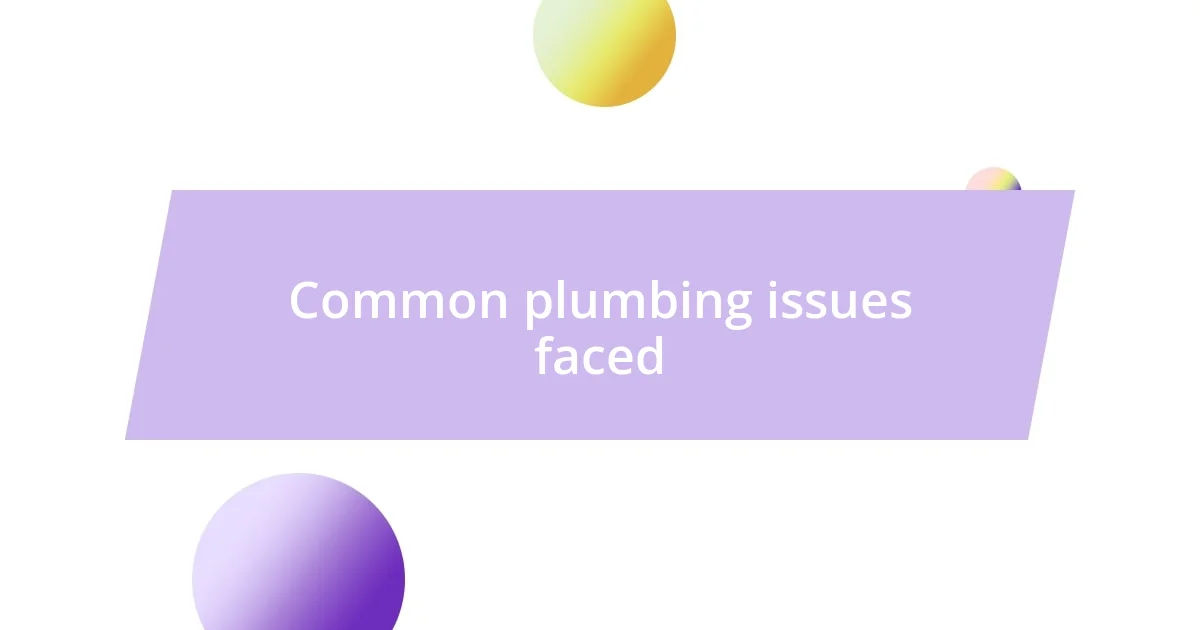
Common plumbing issues faced
Common plumbing issues can catch many homeowners off guard, often leading to stress and scrambling for solutions. I remember vividly the day my toilet decided it would no longer flush properly. The panic set in when I realized I was standing knee-deep in water. That unexpected moment taught me just how crucial it is to recognize the signs of plumbing trouble early on.
Here are some of the most common plumbing issues I’ve encountered:
- Leaky Faucets: These exacerbate water bills and can lead to more severe problems if not addressed.
- Clogged Drains: A slow-draining sink or tub often means something is building up inside the pipes.
- Running Toilets: This can waste a significant amount of water, often due to a faulty flapper or chain.
- Low Water Pressure: This can diminish the effectiveness of daily tasks, like showering or washing dishes.
- Water Heater Issues: No one wants to experience a cold shower when expecting hot water.
Reflecting on these issues, I learned that being proactive in maintenance can save both time and money. For example, after my toilet fiasco, I invested in a simple plunger and a drain snake. They’ve since become my trusted allies, arming me with confidence to tackle any blockage swiftly, turning potential disasters into manageable tasks.
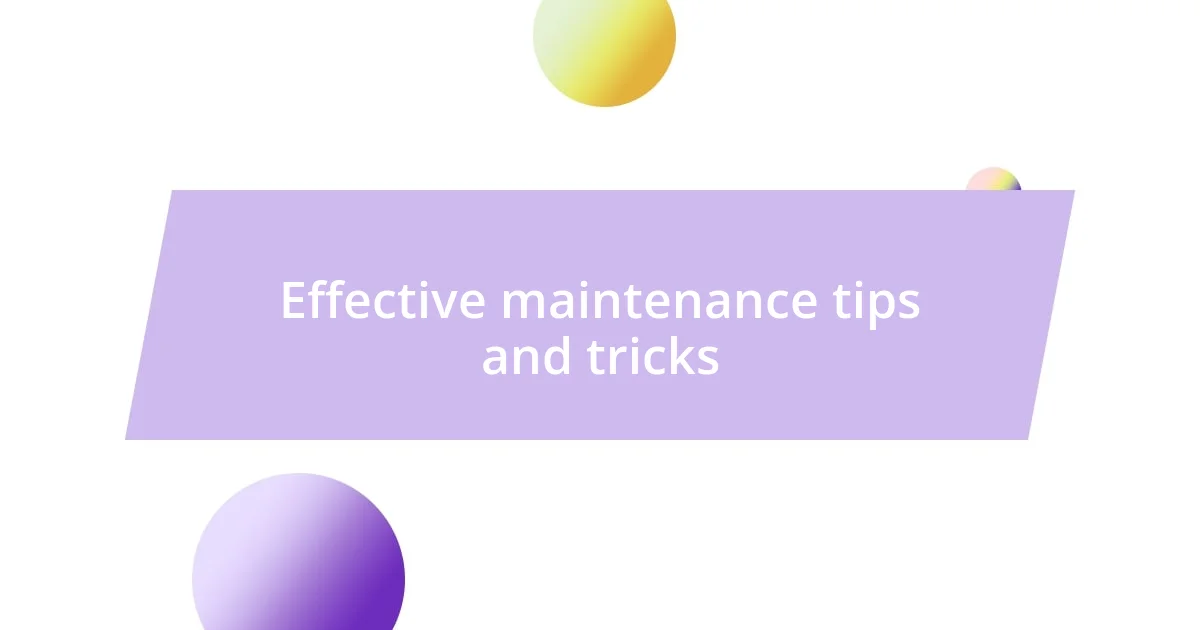
Effective maintenance tips and tricks
Maintaining your plumbing system doesn’t have to be a chore. One effective tip I discovered is to regularly check for leaks by inspecting exposed pipes and connections. I remember a time when I spotted drops forming on a pipe under my sink. It was a simple fix—tightening a screw—but without that check, I could have faced more significant damage and costly repairs down the line. How amazing is it that a few minutes of inspection can save you from a flooding disaster later?
Another trick I swear by is the power of hot water. Once a month, I pour boiling water down my drains to help dissolve any grease or soap build-up. It’s like giving my pipes a little spa day! Not only does this keep things flowing smoothly, but it also prevents the dreaded clogs that can occur over time. I vividly recall the first time I tried this; they had been draining slowly for ages, and it felt like I’d discovered a hidden gem in plumbing upkeep.
Lastly, never underestimate the value of a good plunger. This tool saved me on more than one occasion! I remember a particularly stubborn toilet backup that seemed impossible to resolve. A few vigorous plunges later, and voilà! The water whooshed down, bringing my relief alongside it. Keeping a plunger handy is a small step that can lead to big wins in home maintenance. Who doesn’t want to feel empowered to tackle common plumbing issues head-on?
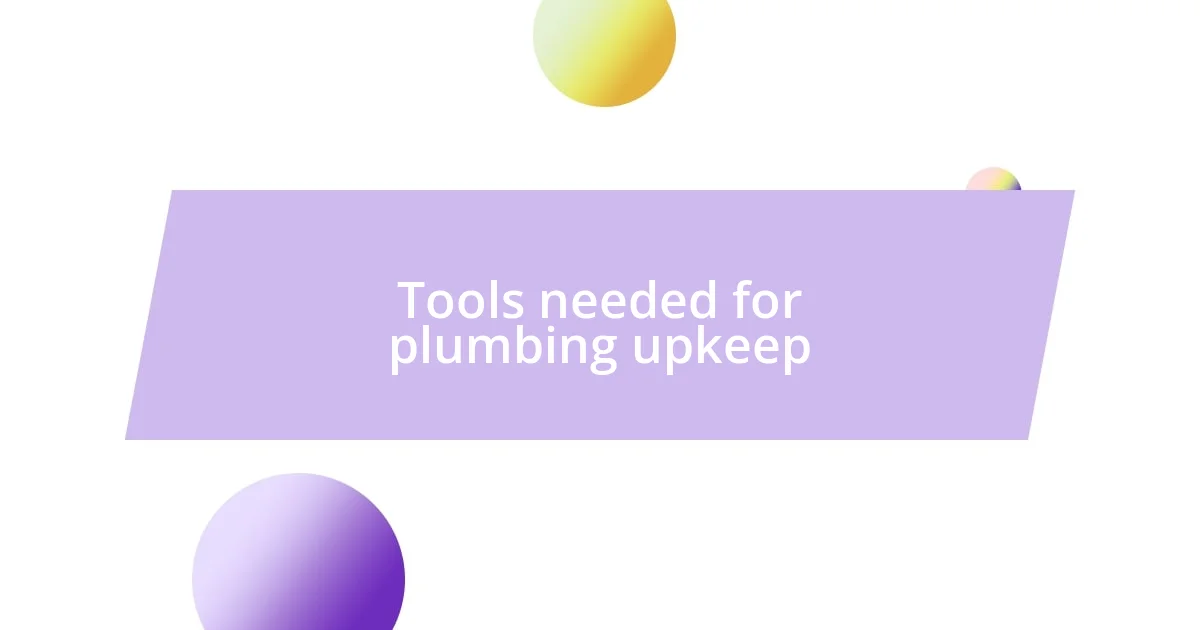
Tools needed for plumbing upkeep
When it comes to plumbing upkeep, having the right tools on hand can make all the difference. A pipe wrench, for instance, is essential for gripping and turning stubborn plumbing components. I’ll never forget the time I faced a leaky connection under my sink. Without my trusty pipe wrench, I would have been completely at a loss. The moment I tightened that connection, I felt a rush of relief wash over me—it’s the little victories that truly matter.
Another tool I consider indispensable is the adjustable wrench. It’s versatile and can handle various sizes of nuts and bolts, which is crucial when dealing with plumbing fixtures. There was an instance when I needed to replace a faucet. I grabbed my adjustable wrench and, despite some initial resistance, the job became smooth sailing. Have you ever attempted a DIY project only to realize halfway through that you didn’t have the right tools? It’s a frustrating experience, but I learned quickly that being prepared saves so much time and stress.
Don’t overlook the importance of a simple plumber’s tape, either. This unassuming roll of tape has saved me from countless leaks. I recall a late-night plumbing emergency when a pipe just wouldn’t stay snug. With a few wraps of plumber’s tape, I managed to stop the dripping. It’s amazing how something so small can have such a significant impact on your peace of mind at home. Isn’t it reassuring to know that you can tackle plumbing issues with just a handful of tools?

When to call a professional
Recognizing when to call a professional can save you a lot of headaches in the long run. I remember trying to fix a severely clogged drain on my own, thinking I could handle it. After a few hours of frustration and no progress, I had to admit defeat. It wasn’t just a minor clog—it turned out to be a deeper issue that required specialized equipment. Sometimes, trusting your instincts and knowing your limits can prevent a small problem from spiraling into a major disaster.
If you’re dealing with consistent leaks or water damage, it’s definitely time to let the pros take over. I once noticed a persistent damp patch on my kitchen floor, which I initially brushed off as a simple spill. After a week of patching it up, I realized it was actually due to a hidden leak in the wall. The damage was far worse than I could have handled alone, and calling a plumber not only resolved the leak but also prevented mold from growing. Your home is an investment, and it’s crucial to protect it.
Lastly, if you find yourself facing plumbing issues that involve gas lines or anything electrical, please call a professional immediately. I’ll never forget the anxiety of dealing with a gas leak in my old apartment. The thought of attempting to fix it myself was terrifying. The peace of mind that came from having a skilled technician safely handle the situation was invaluable. When it comes to potential hazards, there’s no shame in seeking expert help. Safety should always come first.
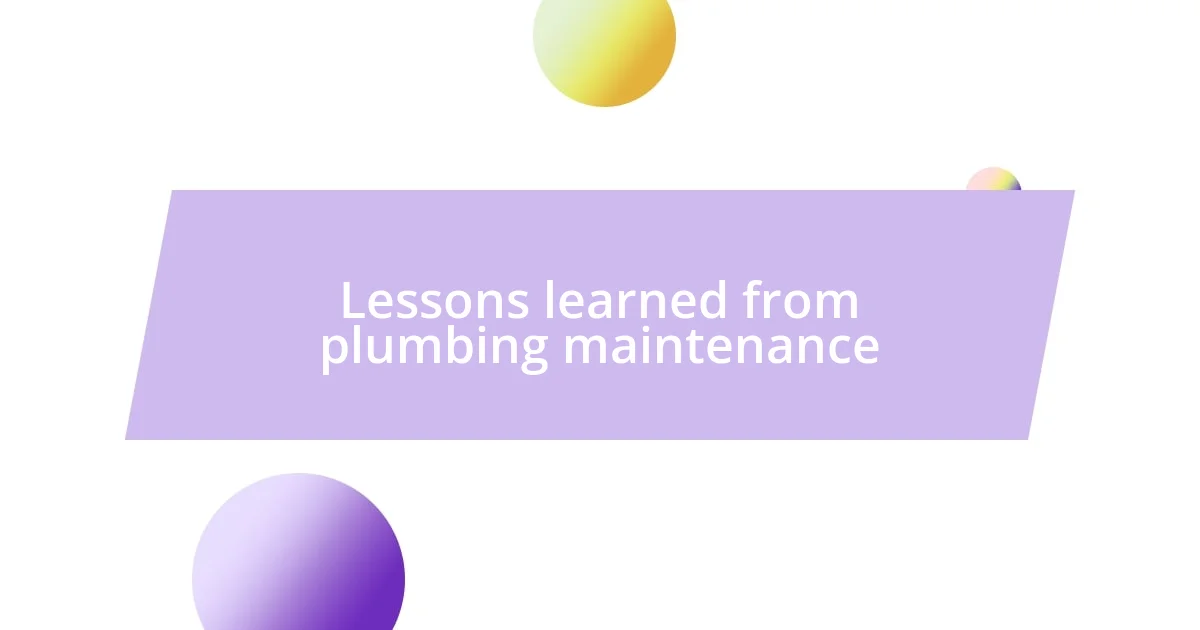
Lessons learned from plumbing maintenance
One major lesson I’ve learned from plumbing maintenance is the value of patience. There have been times when I rushed into a repair, thinking I could fix it quickly, only to end up frustrated because I didn’t fully assess the situation first. I remember dismantling our bathroom sink in a frenzy, but ended up missing a simple blockage right at the top. Taking a moment to breathe and really look at the problem often leads to a much smoother fix. Have you ever felt that urge to dive right in?
Another important takeaway is the significance of regular inspections. I once neglected to check under my kitchen sink for a few months, assuming everything was fine. It came as a shock when I finally opened the cabinet and discovered mold! That realization hit hard—I understood that proactive maintenance is far better than reactive fixes. Regularly checking key areas can save you from facing bigger, more expensive problems later on.
Finally, I’ve recognized that each plumbing project teaches something new. Whether it’s learning the right techniques or discovering a new tool, every experience adds to my toolkit of knowledge. I vividly recall when I finally figured out how to use a drain snake effectively after many failed attempts. It felt like a small victory, but in reality, it was a huge step in building my confidence. Isn’t it fascinating how every challenge can lead to newfound skills and wisdom?












